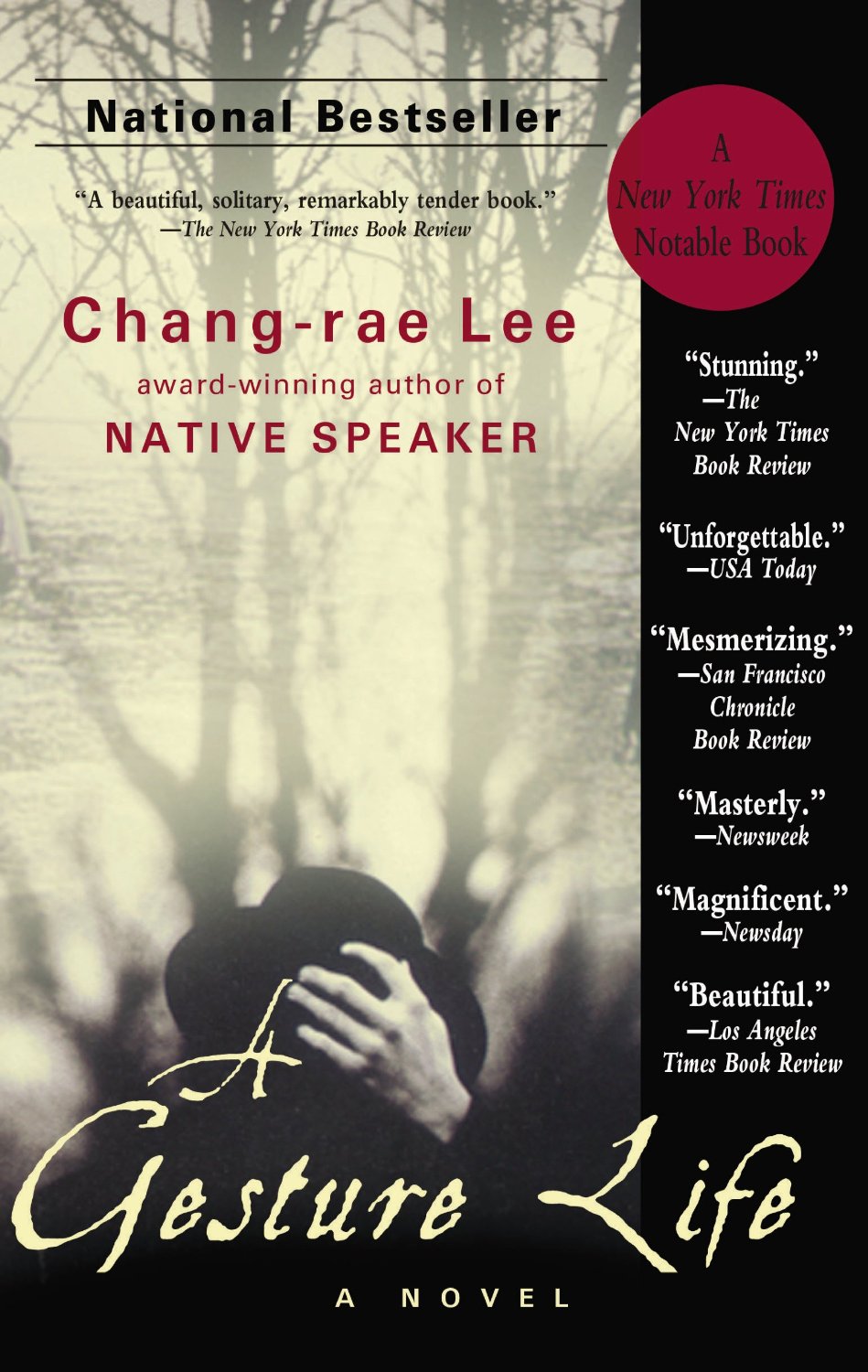15 Nov / A Gesture Life by Chang-rae Lee + Author Interview [in aOnline]

 The Easiest Thing to Do Is Stop Writing
The Easiest Thing to Do Is Stop Writing
Having just returned from Italy where he got a little R&R and did some research on his next novel, Chang-rae Lee didn’t even have time to recover from jet lag before he was back on the road, this time to promote the paperback edition of his current book, A Gesture Life. The work is a remarkable examination of an ethnically-Korean, Japanese American called Doc Hata, his complex relationship with his adopted daughter, and the secrets of his haunted, wrenching past which prevent him from living a full life – leaving only room for gestures.
Doc Hata is the person that Lee is most afraid of becoming, he tells a packed, very mixed audience at Politics & Prose in Washington DC “But he’s the kind of man I’ve known all my life, sometimes I’ve known only too well,” he says ruefully.
The poignant moment doesn’t last long, before he’s explaining to an insistent reader why there are not more visible Korean American writers, that it’s only been 35 years since the 1965 immigration laws were lifted enough to allow Koreans to immigrate in substantial numbers, that not a whole of writers come out of immigrant families … because immigrants are very busy, after all. The crowd laughs, perhaps missing the irony of what Lee is saying.
Like Lee’s memorable debut novel, Native Speaker, A Gesture Life is getting much praise and garnering one award after another. Deservedly so. His third work is, of course, greatly anticipated: ask him what it’s about and he says, “It concerns people who were involved or have experiences with the Korean War, both Americans and Koreans. I can’t say any more than that.” I know, it’s an Asian thing. I never get a full answer. But hey … I keep hoping, so I keep asking.
So what made you write your first novel?
Because I had an idea for a story, a particular story. It was the first story that I felt like I should really sit down and write, that I needed to write, that I felt natural writing. I always wanted to write books. I guess all writers want to be writers and one day they start a book that seems right and that’s the beginning.
How did A Gesture Life come into being?
I started a book that was more directly about comfort women, and I spent two years on it. But I didn’t like it; it just wasn’t working out. The main character of A Gesture Life, Doc Hata, was just a small incidental part of that story, but the more I thought about him, the more interested I became in his life. And I thought he would make a much better story. That became A Gesture Life, which really focuses on Hata and all the little ins and out of his consciousness and his memory, which of course includes the comfort women story.
The original story was horrible. It wasn’t that it was badly written, but it was just a horrible story. It’s about comfort women. And maybe I just couldn’t make it interesting aside from being horrible and tragic. So I threw it away after two years, and started a brand new book.
That’s still a very unhappy story for me … how would you like to work on something for two years and throw it out?
But look at what it eventually led to! You got A Gesture Life out of all that!
But it doesn’t lessen the pain of the realization that not only was it all for naught, but that two years was mostly wasted. That’s hard.
Well, maybe there’s another book in there …
Yes, maybe. There are some other characters in there that I like … maybe I might revisit the book again – but in a very different form.
Which number book tour is this?
My fourth. Although I’ve written two books, this is my fourth, because they send you out for both the hardback and paperback runs.
What’s the best thing about book tours? What’s the worst thing?
The best is that it gives me a chance to see old friends in the cities I haven’t been to in awhile.
The worst is the travel. I’m not a businessman, so I’m not used to all this plane travel. Once I’m actually at a book store, and meeting readers, then it’s always fun. It’s nice to connect with readers, but all the traveling to get to the readers is tough. I’m just not used to it, and to tell you the truth, I find it a big drag. If I could just magically appear, I’d be happy to do all these events.
Do you ever get writer’s block? And what do you do when you get it?
I always get writer’s block. Every day, I get writer’s block. What do I do? I go downstairs, I have a drink of water, I make some food. Then I come back to the writing; I don’t give up. Sometimes it takes a couple of days, but the best way to break through the block is to keep trying, even when I get more and more frustrated. It’s very easy to stop writing – that’s the easiest thing you can do, that anyone can do …
Are you a workaholic?
No, I’m not. Most of the time, I’m writing three or four hours a day, at the most, five. Besides, if I were a workaholic, I would have four books out by now instead of just two.
Author interview: “The Easiest Thing to Do Is Stop Writing,” aOnline website, November 15, 2000
Readers: Adult
Published: 2000
